Nov 4, 2025 – Day 5 in Bhutan, World Peace Prayer Festival, Thimphu
Hello. Today marks the fifth day of visiting Bhutan. It was scheduled to be a full day of activities in Thimphu.
After completing his morning practice and meditation, Sunim had breakfast at 6:30 AM with rice and soup prepared by Korean volunteers.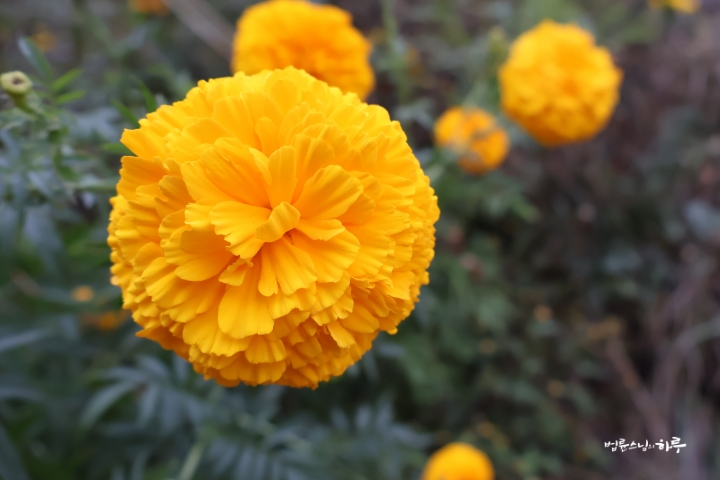
After breakfast, Sunim departed from the accommodation at 7:20 AM to attend the World Peace Prayer Festival at the invitation of the King of Bhutan. He headed to the venue using a vehicle provided by the Bhutanese government.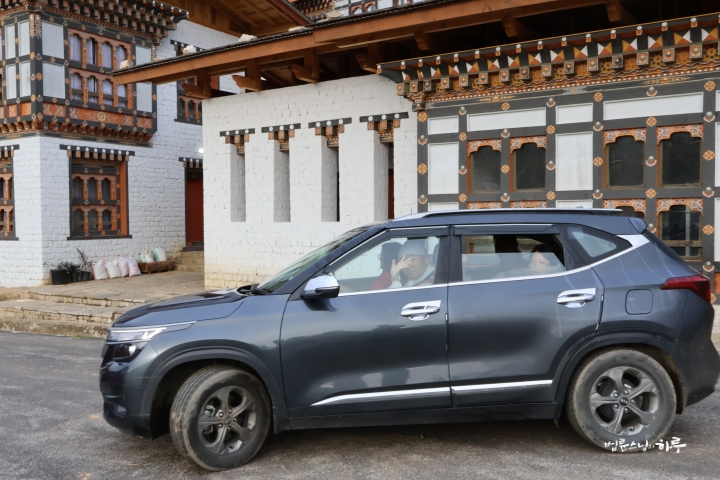
The World Peace Prayer Festival is a place of prayer organized to pray for peace and harmony at this time when conflicts and divisions are intensifying worldwide. This event is a meaningful gathering where the four major schools of Tibetan Buddhism come together to pray for world peace, and it is said to be the first time these four schools have gathered together. The festival lasts for 15 days, and today was the opening ceremony. On the last day of the event, a bhikkhuni ordination ceremony will be held, organized by the Bhutanese Bhikkhuni Foundation, which has deep ties with Sunim.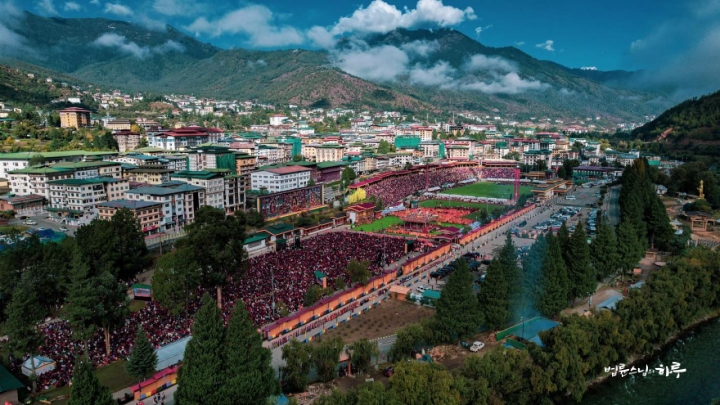
The venue was filled with people who had gathered from all over Bhutan from early in the morning. Sunim attended the event seated in the VIP section as an invited guest. The Cabinet Minister of Bhutan specifically came to greet Sunim.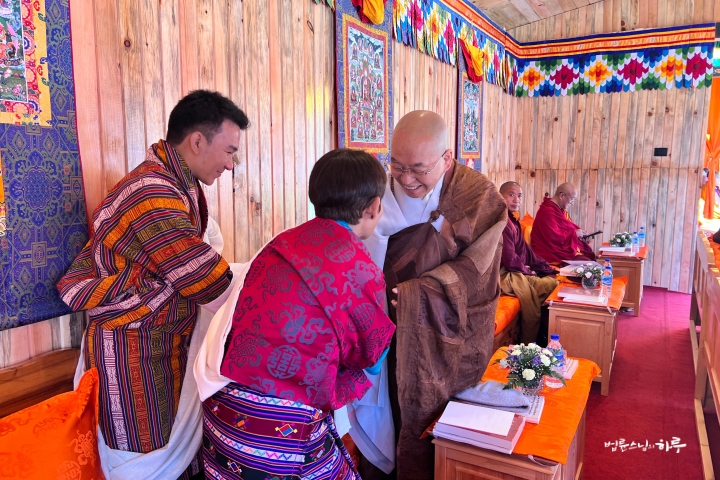
“Thank you for attending despite your busy schedule.”
The opening ceremony began with the attendance of the Sangharaja (the supreme leader of the Buddhist order), representatives of the four major schools of Tibetan Buddhism, members of the royal family, and the current King of Bhutan, the 5th King.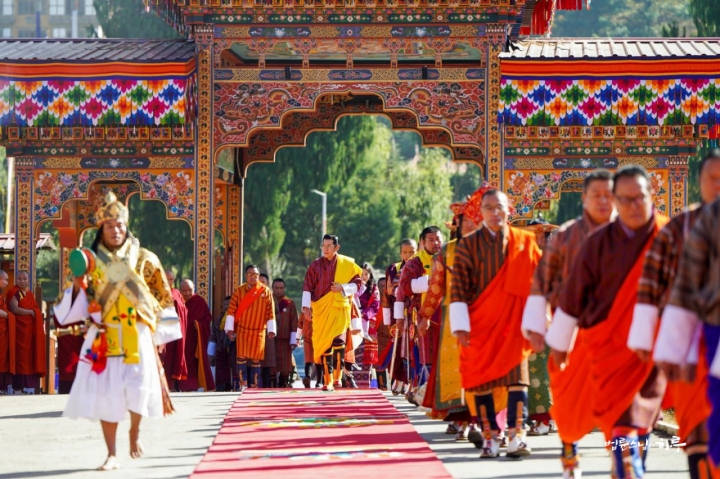
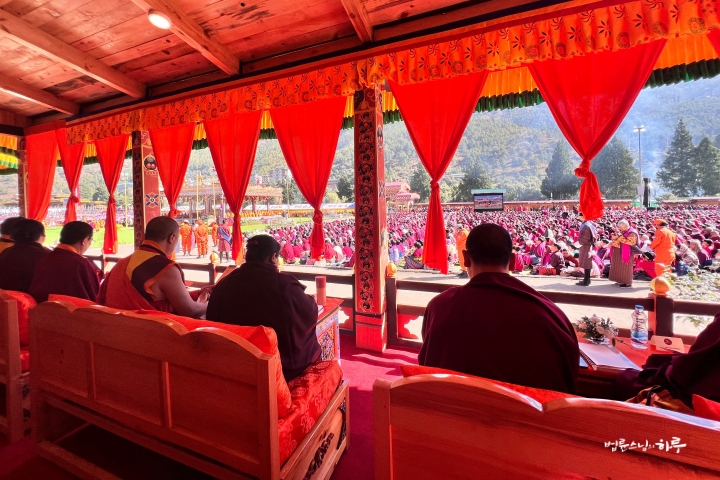
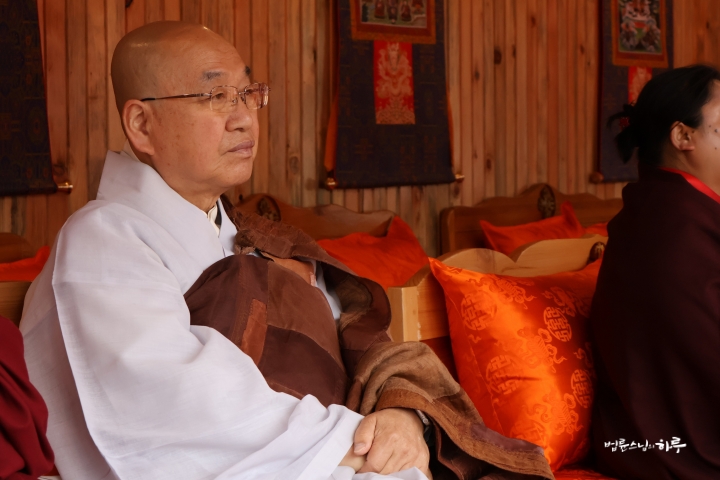
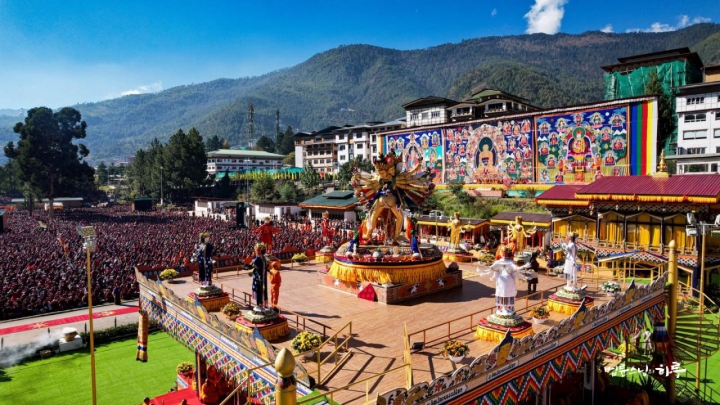
After conducting traditional ceremonies by the kings to mark the opening, the event continued with sound offerings and chanting.
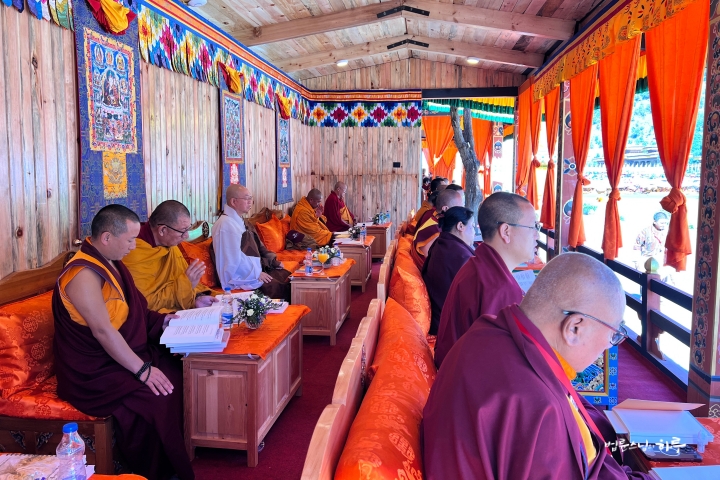
After the event, Sunim greeted the King of Bhutan, and the former King and Queen Mother came to exchange brief greetings.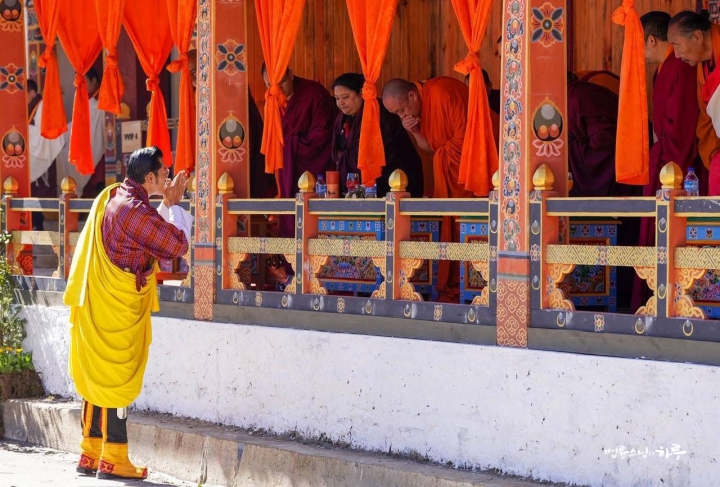
When the opening ceremony ended at 12:30 PM, Sunim moved to ‘Sanmaru,’ a Korean restaurant in Thimphu, for lunch. He had bibimbap prepared by the restaurant owner for lunch.
At 2 PM, Sunim visited the home of Passang Dorji, the former Speaker of the National Assembly of Bhutan, for a meeting. Passang Dorji is someone who became connected with Sunim when they met by chance in India during Sunim’s pilgrimage to Buddhist holy sites last year. Due to Passang Dorji’s poor health, it had been difficult to meet in Bhutan, but they finally met today.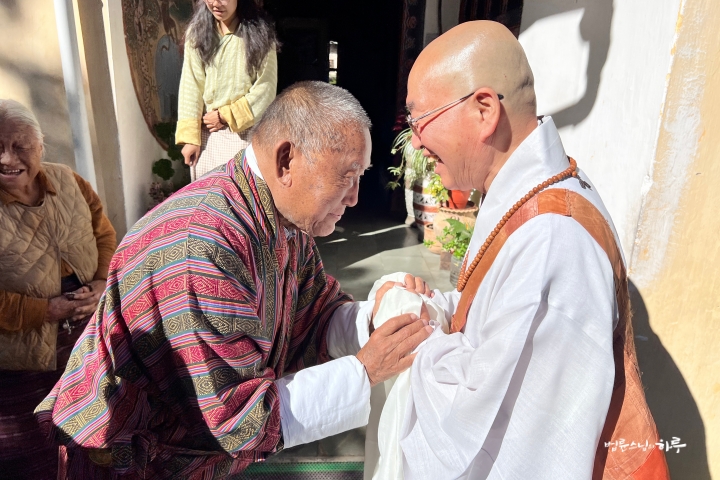
“Welcome, Sunim”
“It’s good to see you looking healthy.”
After exchanging warm greetings, Sunim explained in detail about JTS’s sustainable development projects being carried out in Zhemgang and Trongsa and listened to Passang Dorji’s opinions. They had extensive discussions particularly about purchasing materials needed for Bhutan’s housing improvement projects. First, Sunim introduced the seven projects that JTS is working on with the residents.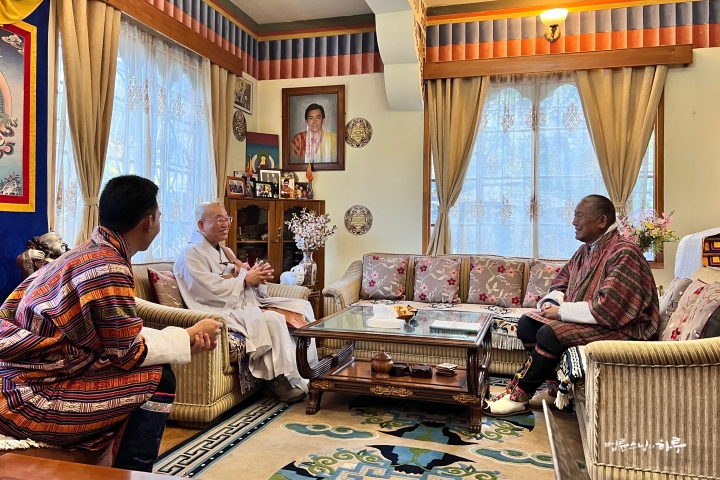
First Steps Toward Sustainable Development: Seven Tasks
“Initially, we made various plans to create a model for sustainable development projects in Bhutan, but when we actually started, there were seven urgent priorities. First, building houses for people who don’t have homes. Second, repairing houses that exist but are too dilapidated and need fixing. Mainly toilets and kitchens need work. Third, paving sections of village footpaths with cement where they become slippery when it rains or where slopes are too steep. Fourth, paving portions of roads used by vehicles. Since most rural areas have unpaved roads, we can’t pave everything, but we plan to partially pave sections that are too steep or where water collects so people can use them.
Fifth is the water supply issue. This region seems to have an overall water shortage, perhaps because it’s mountainous. In the past, having drinking water was enough, but nowadays with more frequent laundry, showers, and toilet use, drinking water has become scarce. There’s barely enough for drinking and washing faces. Sixth, irrigation channel construction for rice farming. Currently, water just flows along dirt paths and disappears along the way, which is the problem. Wherever you go, water shortage is the most serious issue. If we could just solve the water shortage problem, other issues would naturally be resolved – water is the most important issue.
Seventh is installing fences to protect crops from wildlife damage. We need to change the fence installation method. We plan to implement this in phases over three years. The chain-link fences currently being installed as a government project are too expensive. So instead, we plan to provide wire mesh. We also want to change the wire installation method. Currently, wild boars dig underneath, but people just loosely string three or four lines, so it’s hardly effective. We need to install it densely from the bottom and more sparsely as it goes up, in multiple layers. Since deer jump over, we need to add another line at about 2 meters height. When stakes are made of wood, they rot after about 3 years, so many people want metal stakes. However, if you plant saplings during the rainy season, after 3 years those trees themselves grow into a fence. That way, even if a few stakes fall, it’s not a big problem. But since metal mostly has to be imported from abroad, we’re trying to use locally available materials as much as possible.”
“Now iron is also produced in Bhutan. So metal stakes are being made in Bhutan too. If you want, I can help you purchase them at a reasonable price. However, the steel used for fencing is still imported.”
“The material we use most is cement. Next are rebar, wire, and water supply pipes. For water supply construction, we’re planning about 5-7km sections, so we need a lot of pipes. We also need roofing materials, sinks, and toilet bowls. The quantities aren’t large individually, but when building hundreds of houses, the overall scale isn’t small.”
“Cement can save on transportation costs if procured from areas relatively close to Zhemgang. On the other hand, rebar and metal stakes can be produced locally, and only fencing steel needs to be imported. For materials in short supply, if we connect directly with factories on the Indian side, we can get supplies at reasonable prices. I’ll help you with this.”
“Local purchases are convenient for transportation but unit prices are high, while factory direct deals have cheap product prices but separate transportation and distribution costs. We’re currently reviewing which method is most efficient for cost reduction. Right now, reports are coming in by region about houses to be built by this year and next year’s farming season, along with material lists. Once a meeting is held soon, the scale of materials needed will be decided within a few days.”
“When you’re ready, please send me the data. Then I’ll send you quotes too.”
“Please don’t handle the practical work directly, just instruct your staff to ‘get it done well at a good price.'”
“Yes, I understand.”
After about an hour of extensive conversation, they took a commemorative photo together and concluded the discussion.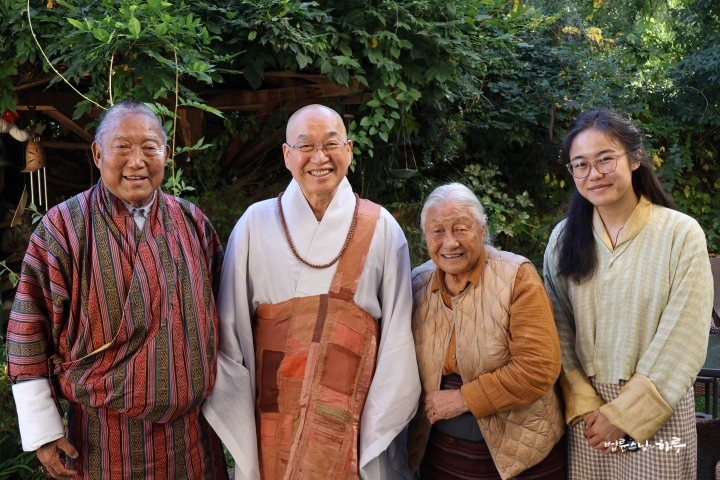
At 3:30 PM, Sunim returned to Sanmaru restaurant to meet and converse with Karma Tshiteem, who served as Chairman of the Royal Civil Service Commission and Chairman of the GNH (Gross National Happiness) Commission. He is someone Sunim has always consulted since starting sustainable development in Bhutan.
First, Sunim shared in detail the results of this visit to Bhutan. Karma Tshiteem responded with a smile.
“There were many similar projects before JTS started its project in Bhutan, but they didn’t succeed due to various problems. This time, I think it will definitely succeed because Sunim is personally supervising and examining everything one by one.”
“Above all, the initial setup is important. That’s why I visited Bhutan ten times last year alone. If we establish principles properly from the beginning, people can follow them later. For example, in the Trongsa area, there’s Nabji village up the mountain and Korphu village below. This time, the people of Nabji village created an irrigation channel themselves. On the other hand, the people of Korphu village sat idle, saying ‘transportation costs are high’ and ‘there’s too much work.’ But when Nabji village created the irrigation channel and water flowed far, there were no more disputes over water, and farming went well, only then did the people of Korphu village come forward saying ‘we want to do it too.’ Instead, the people of Korphu village did a good job with the road. It was originally a place where vehicles had difficulty passing due to steep slopes. After repairing seven sections, vehicles can now pass through. 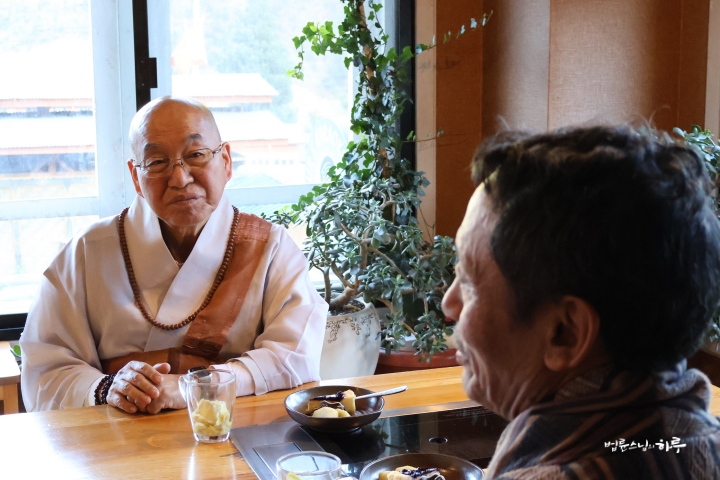
Greater Support for Participating Villages: The Principle of Sustainable Development
However, these results vary greatly depending on who the Tshogpa (village leader) is. In some areas, active Tshogpas achieve three or four times better results than others. In particular, rather than distributing materials equally to every village, JTS follows the principle of providing more support to villages where residents actively participate and less to those that don’t. As a result, villages with high resident participation achieve greater outcomes.”
“I think that’s a good approach.”
Sunim presented Gongjindan (Korean herbal medicine) brought from Korea to Karma Tshiteem, who always provides generous advice.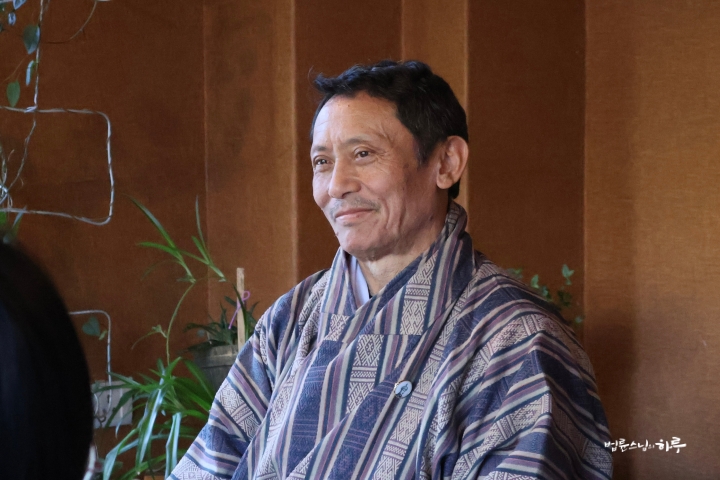
“I’m truly grateful that you not only help so many poor people but also personally prepare a gift for me.”
When Karma Tshiteem expressed his gratitude, Sunim smiled and said:
“The King of Bhutan was the first to create the concept of Gross National Happiness (GNH). And you are the one who has carried on that philosophy and put it into practice for a long time. In future society, it’s most important to consider the natural environment as well. Otherwise, modern civilization cannot last long. I learned about this concept thanks to you, Karma Tshiteem. That’s why I’m always grateful.”
“If you need anything in the future, please feel free to let me know anytime. While there may not be much I can help with, I’ll gladly assist with whatever you request.”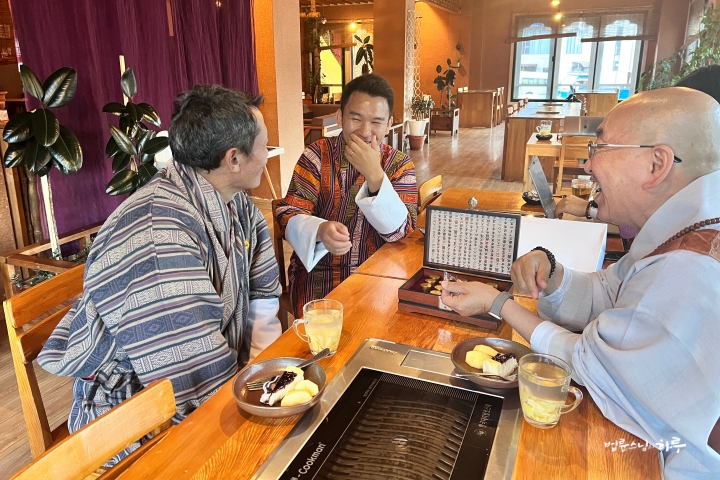
“Because Bhutan is a country with the concept of Gross National Happiness (GNH), it’s a country where we can work together at the government level. There are hardly any countries in the world with this kind of consciousness. That’s why we receive many proposals from other regions like Cambodia and Myanmar saying, ‘We want to try that too.’ If we achieve somewhat successful results in Bhutan, many places want to use it as a model and implement it in other regions. That’s why what we’re doing in Bhutan now is very important.”
“Since you’re doing it yourself, there’s absolutely no reason to doubt its success.”
“We don’t know yet. That’s why I’m not accepting donations now. I’ll accept them after we succeed. When we succeed, that’s when I’ll ask people for support.”
After discussing various current issues with Karma Tshiteem, Sunim returned to the Bhikkhuni Foundation at 4:40 PM.
As the sun set and 6:30 PM arrived, the Queen Mother, who is the mother of the current King of Bhutan and chairperson of the Bhutan Bhikkhuni Foundation, and Dr. Tashi Zangmo, the secretary-general of the Bhutan Bhikkhuni Foundation, came to visit Sunim. The Queen Mother had prepared sandwiches, momos (Bhutanese dumplings), and other foods for Sunim, which they shared for dinner while having a long conversation.
Sunim began by sharing news about Korean youth.
“In the past, Korean youth could buy houses if they worked hard and had hope that they could achieve anything. But now, despite living more comfortably than before, Korean youth have no hope of buying a house with their own efforts, no matter how hard they work. So most don’t get married and don’t have children. Currently, Korea’s birth rate is 0.72 children per woman, the lowest in the world. When two people marry, they need to have two children to maintain the population, but now many don’t even have one. Meanwhile, the suicide rate is the highest among OECD countries. About 26 people per 100,000 population end their lives, with an average of about 35 people taking their lives each day.
Young people from other countries think of Korea as just a good country. Indeed, Korean society is well-organized and life is very convenient. These days, it’s also famous for K-dramas and K-pop. However, the young people actually living there are struggling emotionally. There are hundreds of thousands of ‘reclusive youth’ who don’t leave their rooms and live in isolation. That’s why Jungto Society held an event called ‘Youth Festa’ to understand and encourage young people. Various prominent figures in society, including entertainers, politicians, and education superintendents, all gladly agreed to give free lectures.
Making our village a better place makes me happy.
Like this, a high material standard doesn’t necessarily mean happiness. In the past, people could get married even if they were poor, but nowadays many young people haven’t even dated by the time they’re thirty. That’s why in Bhutan, I urge village residents to make our villages good places to live.
‘If everyone leaves for the city, who will remain in this hometown? The place where you live has clean air and water, with beautiful natural environment. Although you may not live affluently, you have houses, so you can live by keeping them clean. When grandchildren who went to the city visit their grandparents, there should be kitchens, toilets, and running water so they won’t be uncomfortable. Also, since the slopes are steep, we need to pave the roads with cement so people don’t slip on rainy days.’
This way, we’re helping residents gradually change things themselves and make their villages into good places to live.”
“Thank you so much. I hope Bhutan doesn’t become like Korea.”
Sunim then respectfully requested that the Queen Mother visit Korea next year.
“If you tour the bhikkhuni temples located in Korea’s mountains, you’ll get good ideas about how to develop Bhutan’s tourist sites and cultural heritage.”
The Queen Mother happily accepted the invitation. As they concluded their tea conversation, Sunim presented a gift celebrating the 70th birthday of Bhutan’s 4th King. He also asked for understanding about not being able to attend the upcoming bhikkhuni ordination ceremony.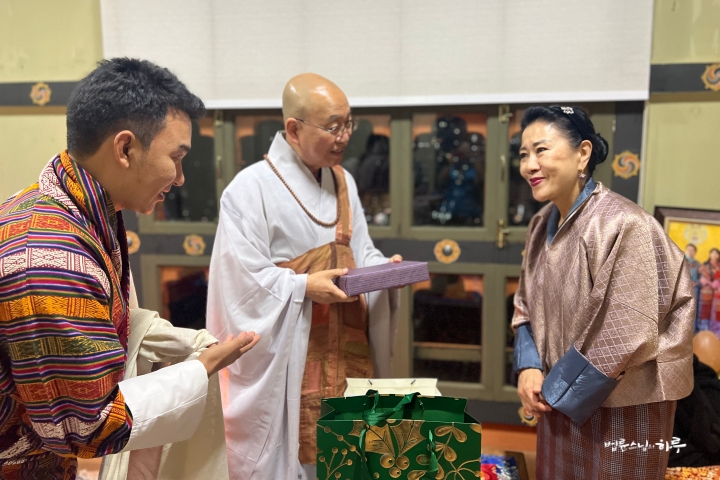
“Originally, Bhutan didn’t have a bhikkhuni system, but thanks to the efforts of the Queen Mother and Tashi, Bhutan now has a bhikkhuni system. I’m truly grateful. I should attend the bhikkhuni ordination ceremony, but I’m very sorry I can’t make time for it.”
He then presented a donation to the Bhutan Bhikkhuni Foundation to help with preparations for the bhikkhuni ordination ceremony.
After finishing the tea conversation and seeing off the Queen Mother and Tashi, Sunim concluded his day’s activities.
Tomorrow, he will depart from Bhutan’s Paro Airport for Korea, transit through Bangkok Airport, and spend the entire day traveling by plane.





